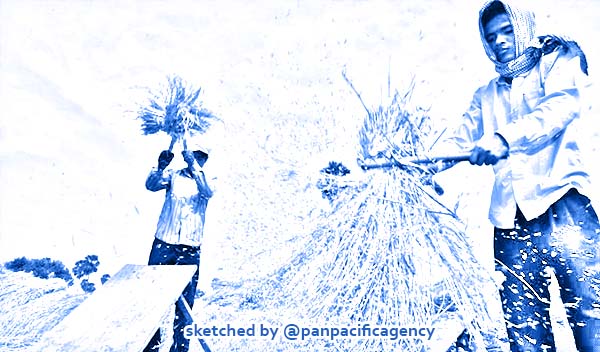PM defends Cambodia’s free market rice pricing

A day after the Agriculture Ministry launched a five-year plan, Prime Minister Hun Sen slams those calling on the government to set the price of rice while also encouraging foreign investment in the Kingdom’s agro-processing industry. KT/Chor Sokunthea. Sketched by the Pan Pacific Agency.
PHNOM PENH, Dec 29, 2019, The Khmer Times. Prime Minister Hun Sen yesterday defended the Kingdom’s stance in letting the free market determine the price of rice and blasted critics by saying Cambodia is not a communist country. Fluctuations in the price of rice have some farmers calling on the government to set a fixed price to safeguard the livelihood of rice producers, The Khmer Times reported.
In 2016, farmers in Battambang, a province once hailed as the ‘rice bowl of Cambodia’, protested and dumped sacks of rice on National Road 5 after the price dropped to about $0.20 per kilogramme.
The Cambodia Rice Federation last week reported fragrant paddy rice sold for about $0.25 per kilogramme, which represents a ten percent decrease compared with the prices during the previous harvest.
During a graduation ceremony at the Royal University of Law and Economics in Phnom Penh yesterday, Mr Hun Sen said the call to have the government intervene in the price of rice is not reasonable.
“People hate communist regimes and they [critics] demand that I implement something like a communist regime would – they want us to set the price of rice,” he said. “Communist regimes use planned economics – the state is the one that sets the price of goods. [Critics] do not even know economics and they want the government to do something you hate.”
“If we set the price of rice, we would have a planned economy system that is implemented by communist countries,” Mr Hun Sen added. “It is the same system used by socialist countries.”
He said the Kingdom has a free market economic system and the private sector has the right to determine prices of goods.
Mr Hun Sen said he can only urge the private sector to implement the government’s advice, but the government cannot force businesses to do so.
“We can only appeal to people to set an affordable price,” he said. “The state is not requiring them to set the price of rice.”
“[Critics] say then why can the government set the minimum wage for workers,” Mr Hun Sen added. “I want to say that it is not a decision solely made by the government, it is a tripartite decision made by the government, employers and unions through voting.”
Theng Savoeun, president of the Coalition of Cambodian Farmers Community, yesterday said farmers want the government to set a fixed price for rice because many of them rely on the income rice generates to sustain their lives.
“In a free market system, the government cannot set the price of rice…but the government needs to ensure better prices of rice,” Mr Savoeun said. “They need to have an acceptable strategy to ensure farmers do not lose money or face debt.”
He noted the price of rice cannot be set too high either because it would affect consumers.
“Normally, our farmers just follow prices set by brokers – farmers are not the ones who set the price,” Mr Savoeun said. “I think government intervention is very important.”
He said the government should consider providing low-interest loans to farmers, build the needed infrastructure to enable farmers to harvest rice more than once per season, provide technical assistance for better rice quality and find markets.
Ton Dok, 50, a farmer from Battambang’s Sangke district, yesterday said rice growers spend a lot of capital to cultivate rice.
Mr Dok said brokers set the price of high-quality rice between $0.20 and $0.25 per kilogramme.
“Normally, brokers set the price of rice, but when we start harvesting, they drop the price,” he said. “We want better prices so we can support our family and repay debts.”
Mr Dok said the government must ensure stable and fair prices.
“We want stable rice prices, which is 1,000 riel [$0.25] for middle-quality rice and 1,200 riel [$0.30] for high-quality rice,” he said.
Koh Raksmey, 48, another farmer in Battambang, agreed.
“Rice buyers [brokers] always try to buy my rice for cheaper prices and it is not fair,” Mr Raksmey said. “We want the government to intervene to set a fixed price to avoid future drops in prices. Right now, the price of rice is what brokers determine.”
Song Saran, CEO of Amru Rice and president of the Cambodia Rice Federation, yesterday said the free market should determine the price of rice and the government is on the right track.
“I think our current mechanism is on the right track – our price of rice is not too high, not too low,” Mr Saran said. “I want our farmers to become entrepreneurs. We should think about reducing the price of electricity, fertiliser, machinery…and building better infrastructure rather than setting a fixed price for rice.”